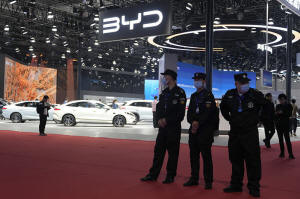Chinese investors snap up stocks on hopes for an end to price wars and
overcapacity
[July 21, 2025] By
KEN MORITSUGU
BEIJING (AP) — China’s stock market is buzzing over government promises
to tackle price wars that have hurt profits and worsened global trade
tensions.
The prevailing catchphrase is “anti-involution,” and it reflects efforts
to curb intense competition and overcapacity in industries like solar
panels, steel, and electric vehicles.
With rising trade barriers such as President Donald Trump's higher
tariffs, and relatively weak domestic demand, manufacturers have been
slashing prices, undermining their bottom lines and driving some out of
business.
The producer price index, which measures the price that factories
receive for their goods, has fallen steadily for nearly three years in
China in a prolonged bout of deflation. The long-running issue spilled
over into global markets as low-priced Chinese exports worsen trade
friction with key trading partners including the United States and
Europe.
Solar panel glass makers agree to cut output by 30%
In a series of recent statements, the Chinese government and industry
associations have signaled they're getting serious about reining in
cut-throat competition, known as invollution or “neijuan” in Chinese.
The top 10 makers of glass for solar panels agreed on June 30 to shut
kilns and cut production by 30%, an industry association said. The
government has launched an auto safety inspection campaign, addressing
concerns that automakers were skimping on quality to cut costs.

It's unclear whether these efforts will succeed, but the sense that
China may finally be tackling this chronic problem was enough to spark a
rally in stocks in some of those under-pressure sectors.
Shares of Liuzhou Iron & Steel Co. gained 10% on Friday and have risen
more than 70% since June 30. Solar panel glass producer Changzhou
Almaden Co. fell at the end of last week but is still up about 50%.
More broadly, two exchange traded funds in solar panels and steel have
risen about 10%, outpacing a 3.2% rise in the Shanghai Composite,
China's leading market index.
The performance of EV-maker stocks has been mixed, with Li Auto and Nio
recording double-digit percentage gains while market leader BYD
declined.
Foreigners can't buy Chinese stocks directly but they are able to invest
in about 2,700 stocks and 250 exchange traded funds through the Hong
Kong exchange.
Government calls intense price wars “disorderly”
The gains follow high-level government pronouncements against disorderly
price wars. On June 29, the People's Daily newspaper, the mouthpiece of
the ruling Communist Party, ran a lengthy page 1 article on involution,
saying they run counter to the party's goal of high quality economic
development.
Chinese leader Xi Jinping weighed in at a closed-door economic meeting,
calling for better regulating competition and incentives by local
governments to attract factory investments that are blamed for
overinvestment in affected industries.
The tougher talk began with a focus on automakers in late May,
specifically around electric vehicle price wars that began more than
three years ago.

[to top of second column] |

Security personnel on duty stand near the BYD booth during the
Shanghai auto show on April 23, 2025. (AP Photo/Ng Han Guan, File)
 Analysts at investment bank UBS said
the shift is good news for auto industry profits and company stocks.
“Though it’s difficult to imagine a sudden U-turn of the industry
from fierce competition to orderly consolidation, it’s indeed
possible to have near-term ceasefire of the price war,” they wrote.
Weak demand and overcapacity bring a fight for
survival
After BYD launched another round of price cuts on May 23, some
competitors, the main industry association and government all called
for fair and sustainable competition.
The EV battery industry, the cement association and major
construction companies have issued statements echoing calls for an
end to excess competition.
The term involution, which suggests a spiraling inward and
shrinking, was initially applied in China to students and young
workers, who felt they were caught up in meaningless competition
that led nowhere as the job market weakened and wages stagnated in
recent years.
At the industry level, it has come to mean sectors that have too
many companies competing for a slice of the pie, leading to fierce
price cutting to try to gain market share.
The mismatch between production capacity — how much an industry can
make — and actual demand for the product, reflects overcapacity that
forces companies to compete for survival in a limited market space,
said a recent article in the Communist Party magazine Qiushi.
Obstacles to fixing the problem
Some Chinese industries, especially steel and cement, have long
suffered from overcapacity. A government push to promote green
industries has fostered similar problems in that sector, including
solar panels, wind turbines and electric vehicles.

A flood of Chinese exports is leading to more trade barriers in
Europe and the U.S. and in some emerging markets such as Mexico,
Indonesia and India.
Ultimately, economists say industries need to consolidate through
company mergers and bankruptcies. But the process will take time. A
major obstacle is provincial governments that want to protect local
companies and jobs.
Alicia García-Herrero, the chief economist for Asia-Pacific at the
Natixis investment bank, said that recent comments by top Chinese
economic officials suggest they realize something needs to be done.
“How much is action versus words, I don’t know,” she said. “But I do
think it’s a big problem for China.”
___
Associated Press researcher Yu Bing contributed.
All contents © copyright 2025 Associated Press. All rights reserved |